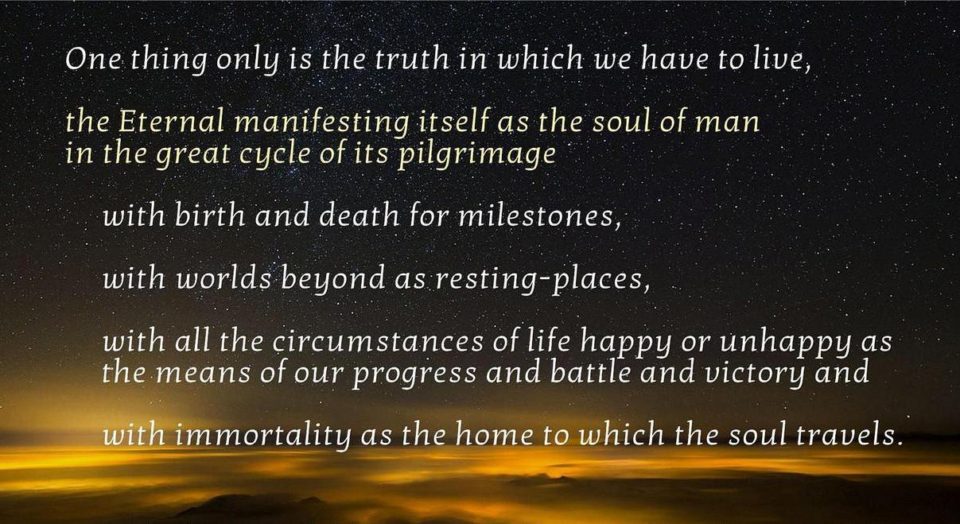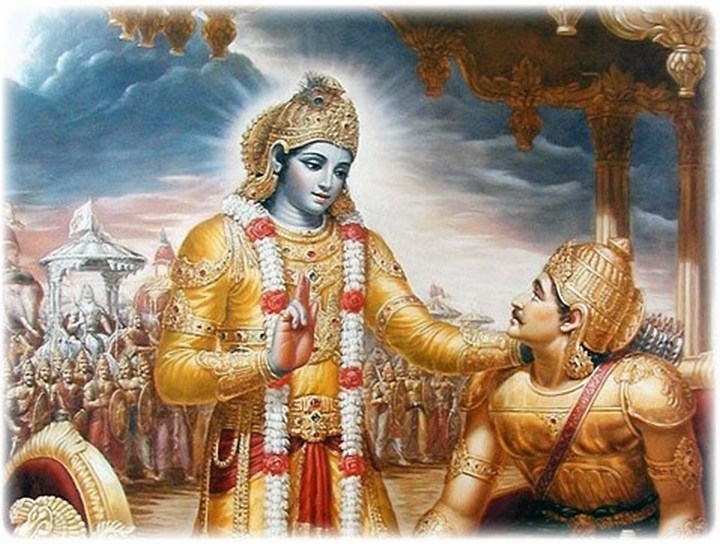Words of Sri Aurobindo
There is no such thing as death, for it is the body that dies and the body is not the man. That which really is, cannot go out of existence, though it may change the forms through which it appears, just as that which is non-existent cannot come into being. The soul is and cannot cease to be. This opposition of is and is not, this balance of being and becoming which is the mind’s view of existence, finds its end in the realisation of the soul as the one imperishable self by whom all this universe has been extended. Finite bodies have an end, but that which possesses and uses the body, is infinite, illimitable, eternal, indestructible. It casts away old and takes up new bodies as a man changes worn-out raiment for new; and what is there in this to grieve at and recoil and shrink? This is not born, nor does it die, nor is it a thing that comes into being once and passing away will never come into being again. It is unborn, ancient, sempiternal; it is not slain with the slaying of the body.
Who can slay the immortal spirit? Weapons cannot cleave it, nor the fire burn, nor do the waters drench it, nor the wind dry. Eternally stable, immobile, all-pervading, it is for ever and for ever. Not manifested like the body, but greater than all manifestation, not to be analysed by the thought, but greater than all mind, not capable of change and modification like the life and its organs and their objects, but beyond the changes of mind and life and body, it is yet the Reality which all these strive to figure […].
All are that Self, that One, that Divine whom we look on and speak and hear of as the wonderful beyond our comprehension, for after all our seeking and declaring of knowledge and learning from those who have knowledge no human mind has ever known this Absolute. It is this which is here veiled by the world, the master of the body; all life is only its shadow; the coming of the soul into physical manifestation and our passing out of it by death is only one of its minor movements. When we have known ourselves as this, then to speak of ourselves as slayer or slain is an absurdity. One thing only is the truth in which we have to live, the Eternal manifesting itself as the soul of man in the great cycle of its pilgrimage with birth and death for milestones, with worlds beyond as resting-places, with all the circumstances of life happy or unhappy as the means of our progress and battle and victory and with immortality as the home to which the soul travels […].
It is the creed of the Aryan fighter. “Know God,” it says, “know thyself, help man; protect the Right, do without fear or weakness or faltering thy work of battle in the world. Thou art the eternal and imperishable Spirit, thy soul is here on its upward path to immortality; life and death are nothing, sorrow and wounds and suffering are nothing, for these things have to be conquered and overcome. Look not at thy own pleasure and gain and profit, but above and around, above at the shining summits to which thou climbest, around at this world of battle and trial in which good and evil, progress and retrogression are locked in stern conflict. Men call to thee, their strong man, their hero for help; help then, fight. Destroy when by destruction the world must advance, but hate not that which thou destroyest, neither grieve for all those who perish. Know everywhere the one self, know all to be immortal souls and the body to be but dust. Do thy work with a calm, strong and equal spirit; fight and fall nobly or conquer mightily. For this is the work that God and thy nature have given to thee to accomplish.”
[Sri Aurobindo, “The Creed of the Aryan Fighter” – from “Essays on the Gita”, CWSA 19]





